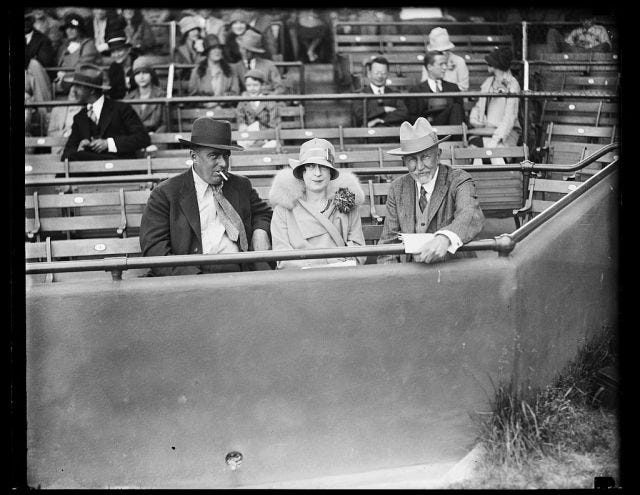The Generations of Mr. Prospector

Hi, folks. I've split this edition of The Black Umbrella into three sections. The usual links to my latest work are at the bottom, so skip right there if you're not interested in the ponies or the weird old shit I found on YouTube.
Part 1: It's Mr. P's Game Now
On the first or second Saturday in June most years, the plumbing breaks down at Belmont Park.
The grandstand at the old horse track is an echoing emptiness anytime you visit except for that one afternoon each spring, when a hundred thousand people show up to watch the Belmont Stakes. Vast matrices of always-empty seats have tickets and ushers; toilet lines stretch for miles; and the plumbing system, too old for such exertions, habitually overextends itself.
Belmont Park's brief transformation for the Belmont Stakes will happen again this Saturday. With the possibility of a Triple Crown sweep in the offing, the crowd this year will be extra-vast; the toilet lines extra-long.
Me, I got into this sport for the empty days; for those Aqueduct winter weekends back before they built the casino, when the grandstands smelled of pot, the security guard corps consisted of one guy with a lazy eye, and it was just me and the degenerates watching the odds change.

It was on a winter day like that, maybe six or seven years ago, that I hit the Pick 6. The Pick 6 is a silly bet with lottery-long odds; the royal flush of horse betting, or maybe the Mega Millions. To win, the horseplayer must predict the winners of six consecutive races. If I remember my high school math right, that's a highly unlikely proposition.
I’d gone out to Aqueduct alone that day with a paperback and a copy of the racing form, the horseplayer's Kabbalah. The form is filled with numbers and arcane symbols, and with koans like "loomed boldly" and "fractious gate." The notion is that the individual horseplayer can apply to its mysteries their own particular system, and come away with occult knowledge that will make them, at least for one or two races, the smartest money on the track.
I'd marked up my copy of the racing form according to a dumb system I'd devised that had never really worked before that day, and hasn't worked since. But four races into the Pick 6 that cold afternoon, I realized something different was happening. After the fifth, I couldn’t bear to watch, so I went inside and read my book, which I vaguely recall being a Simenon mystery, but let’s just say it was a Dick Francis.
I saw the sixth race go my way out of the corner of an averted eye, and though it turned out that an unusually large number of bettors had also gotten lucky, and that as such the payout was relatively small for a Pick 6, I was fucking thrilled.

I’ve been to the Belmont Stakes a couple of times. For the humans, it’s a lot of crowds and lines and bad food. For the horses, at least this year, it’s a family reunion.
The dynamics of thoroughbred breeding are such that a few famous stallions turn up in the pedigrees of an extraordinary proportion of active racehorses. It’s rare to find a race on a New York track with no entrants descended from the legendary Seattle Slew, who won the Triple Crown in 1977, or Northern Dancer, who won the Derby and the Preakness in 1964.
This Saturday, the happiest stall in horse heaven will belong to a stallion named Mr. Prospector, who died in 1999 after siring more than a thousand foals at six-figures per, and was buried at his Kentucky farm next to Secretariat.
The entire field in this year’s Belmont Stakes is descended from Mr. P.
Bravazo, a brown colt who came close to upsetting the favorite in the Preakness, is Mr. P's great-great grandson. (I'm using human terms here rather than horse terms, because horse terms are confusing.) Justify, who's one very long race away from seizing the Triple Crown, is Mr. P's great-grandson and his double great-great-great grandson. Mr. P shows up twice in the pedigrees of the colts Vino Rosso, Blended Citizen, Gronkowski, Tenfold, Restoring Hope, Noble Indy; and three times in the pedigrees of Hofburg and Three Drop Billy.
Before he was a full-time inseminator, Mr. P raced. His career lasted fourteen outings before an injury forced him off the track in 1974. That would have been a reasonable length for a horse's career today, but Mr. P raced in the 1970s, when thoroughbreds generally lasted far longer in their racing silks. Dust Commander, the stallion who won the Kentucky Derby in 1970, the year of Mr. P's birth, raced forty-two times in his life. The 2016 Derby winner, by contrast, a great-great grandson of Mr. P named Nyquist, retired later that year after running just eleven times.
Others who understand all this far better than I do have argued that it’s the very dominance of Mr. P’s particular genes, which favor the kind of equine precociousness that’s helpful in winning the Triple Crown at the age of three, that has shortened the average careers of today's racing thoroughbreds. Mr. P’s blood was strong but delicate, and as it has spread through the herd, he's introduced a tendency towards premature debility that’s helped make eleven races, each of which lasts around two minutes, a perfectly respectable life’s work for a thoroughbred.
Out in the paddock at Belmont, where the riders greet their horses and the trainers pat them goodbye, there’s a statue of Secretariat (twenty-one lifetime starts) bounding down the stretch. The paddock is lovely; an elegant oval under an ancient white pine. And though it's there all year round, it feels about as much of a piece with the regular business of New York City horse racing as the Belmont Stakes crowds.
Secretariat is the presiding shade of the Belmont paddock, but these late hours in the history of American thoroughbred racing belong to Mr. P. In 2018, a horse's racing career is fast and short; the tracks are empty; the grandstands echoing; and the plumbing past its prime. The statue of Secretariat is lovely. But it's Mr. P whose sweating, heaving descendants will get jammed into the gates on Saturday evening, chase each other around the track, win, lose, and retire after just a couple more races.
Take the train out on Saturday and pay your respects to the statue of Secretariat. I'll see you at Aqueduct next winter.

Part 2: Words Of Advice
Forget about podcasts. Start listening to P.G. Wodehouse as read by Jonathan Cecil. (IMPORTANT: Do not listen to P.G. Wodehouse audiobooks read by anyone else.)
Listen to this: "Der Fuhrer's Face," Spike Jones, 1942.
And also this: Meir Kahane's bar mitzvah student offers his gloss on the Israeli folk song "Tzena Tzena."
Apropos of Part 1 of this newsletter, if you didn't catch this year's Preakness you actually should. Legitimately thrilling.
Part 3: My Latest
As promised, here's what I've been working on.
This one's from yesterday: "Ex-Camper Accuses Female Orthodox Counselor Of Sex Abuse."
Thanks so much for reading!
JNK
